
By Allison Cale, PhD Candidate in Genetics and Genomics
As someone who is interested in a career focused on the ethical, social, and legal implications (ELSI) of advancements in genetics and genomics, I enjoyed the immense privilege of attending the 15th International Conference on Bioethics, Medical Ethics, and Health Law for four days this past October in Oporto, Portugal. While at the conference, I attended sessions on: reproduction; research ethics; medical negligence and medical ethics; healthcare ethics; “biolaw” and health law; genetics and epigenetics; human dignity; bioethics and the Holocaust; and bioethics and film.
Attendance at this conference filled in significant knowledge gaps regarding the ethics landscape surrounding clinical genetics and health research. For example, I learned about the tenets (and accompanying discourses) of the Declaration of Helsinki, an international document providing guidelines for research on human subjects. Ethical tensions encountered in medical research and through the course of normal day-to-day clinical activities were intensely discussed throughout the conference. My favorite research talk on this subject was, “It’s a nightmare: informed consent in pediatric genome-wide sequencing,” because it provided a realistic discussion of how factors such as the potential for incidental findings and unrealistic expectations (i.e. false hopes) complicate informed consent.
Additionally, modern genomics research often makes use of biobanks, which are repositories of biological samples, health information, and/or genetic sequencing data, which scientists can petition for access in order to study health outcomes. I learned about a more recent international document called the Declaration of Taipei, which provides guidelines and ethical considerations for collecting, housing, and utilizing this kind of data. Talks throughout the conference expanded on data privacy concerns specific to genetic data storage and access.
Finally, there was much discussion about the ethics regarding research on epigenetics (specifically maternal behavioral epigenetics); in vitro gametogenesis (being able to program a cell into a sperm or an oocyte); “designer babies” produced by germline gene-editing and embryo selection; and artificial wombs. Talks on these subjects in particular excited me, as they dealt with complex questions, including: how some scientific research can reinforce regressive social constructions of women as “motherly caregivers” or free us from them depending on use and intent; how scientific advancements meant to help people may also end up deepening the economic healthcare access divide and additionally create novel social divisions; and the rights and wishes of children who do not yet exist, including anticipatory autonomy and the right to not be seen as a product to be perfected.
This experience truly invigorated me and excited me about what my career after graduate school may evolve into. This conference provided me with new information, new frameworks, and new terminologies that are used within ethics and bioethics, and specifically with regards to ethical questions about genetics.
